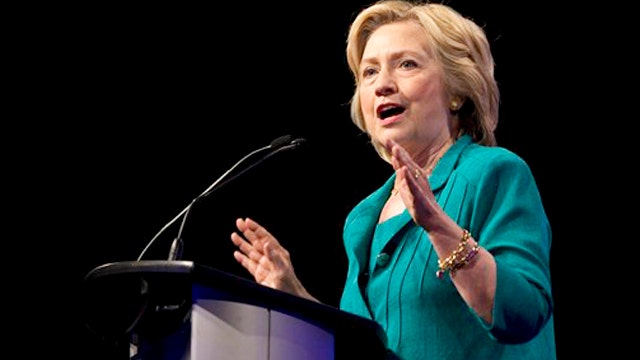'Clinton Cash' author on UBS connections to the Clintons
Peter Schweizer says ties date back to Mark Rich pardon
Dozens of Hillary Clinton emails from a new batch released by the State Department Friday contain retroactively classified sections, dealing with everything from post-coup Honduras to meetings with Middle East allies.
The release underscores concerns, which have mounted in recent days, that the Democratic presidential candidate's private email account contained sensitive information -- though Clinton stresses she never sent or received anything that was classified at the time.
In the emails made public Friday, the government censored passages to protect national security at least 64 times in 37 messages, including instances when the same information was blacked-out multiple times. State Department spokesman Mark Toner said Friday that this information was all retroactively upgraded to "confidential."
The department also fell short of a court-ordered target in Friday's release.
The government released 2,206 pages of emails, bringing the number to roughly 12 percent of the 55,000 pages Clinton had turned over to department lawyers earlier this year. That falls short of the 15 percent goal set by a court ruling in May, a lag the State Department attributed to interest by the inspector general of the U.S. intelligence community into the possible compromise of classified information.
Toner pledged, "We will make up for [the] gap," while admitting they "fell short this month."
Among the retroactively classified emails was one from Clinton adviser Huma Abedin in October 2009 regarding a call with Palestinian Authority President Mahmoud Abbas.
Another from the same period concerned Honduras, in the months after a coup in the Central American country. Yet another concerned a meeting with United Arab Emirates representatives. Other information in these emails is redacted.
Other emails are included in full, and show officials speaking bluntly.
In a November 2009 email, Clinton writes to then-Ambassador to Iraq Christopher Hill praising him for help on a recently passed election law.
Hill thanks her and adds, "I wish I felt better about Iraqis as a result, but I truly remain worried about these people. They are truly a collective pain in the neck."
Meanwhile, in a March 2012 email to aide Jake Sullivan, Clinton says a memo from confidant Sidney Blumenthal about the breakup of Libya “strains credulity.” She asks Sullivan, “What do you think?” about the notion the United Kingdom and France were behind the civil war, as apparently posited by Blumenthal.
In a response to Clinton, Sullivan characterizes Blumenthal’s memo as a “thin conspiracy theory.”
In a May 2, 2011, memo immediately after the death of Usama bin Laden, Blumenthal raises the question of whether Al Qaeda, armed with U.S. weaponry intended for the rebels in Libya, would attack in retaliation.
“Sources with access to the leadership of the Libyan rebellion's ruling Transitional National Council (TNC) stated in confidence that they are concerned that the death of al Qa'ida leader Osama Bin Laden will inspire al Qa'ida in the Islamic Maghreb (AQIM) to use weapons they have obtained, which were originally intended for the rebels in Libya, to retaliate against the United States and its allies for this attack in Pakistan,” he wrote.
Memos recently sent by the inspector general, I. Charles McCullough III, alerted the FBI to a potential security violation arising from Clinton's use of a private server located in her home, a counterintelligence referral the office says it is required to make under law. The inspector general earlier said his office had found four emails containing classified information while reviewing a limited sample of 40 of the emails provided by Clinton.
Those four messages were not marked as classified but should have been handled as such because they contained classified information at the time they were sent, the inspector general said.
The release of the emails Friday is part of a large cache of emails that Clinton had sent or received via her private email address and server while she was secretary of state from 2009 to 2013. A federal judge had ordered the release of more emails every 30 days per an Freedom of Information Act (FOIA) request. This is the third such release.
Meanwhile, the Clinton presidential campaign released a statement from her doctor Friday afternoon declaring she is in "excellent physical condition and fit to serve as president of the United States." She also plans to release tax return information.
Fox News' Lucas Tomlinson and Chad Pergram and The Associated Press contributed to this report.













































